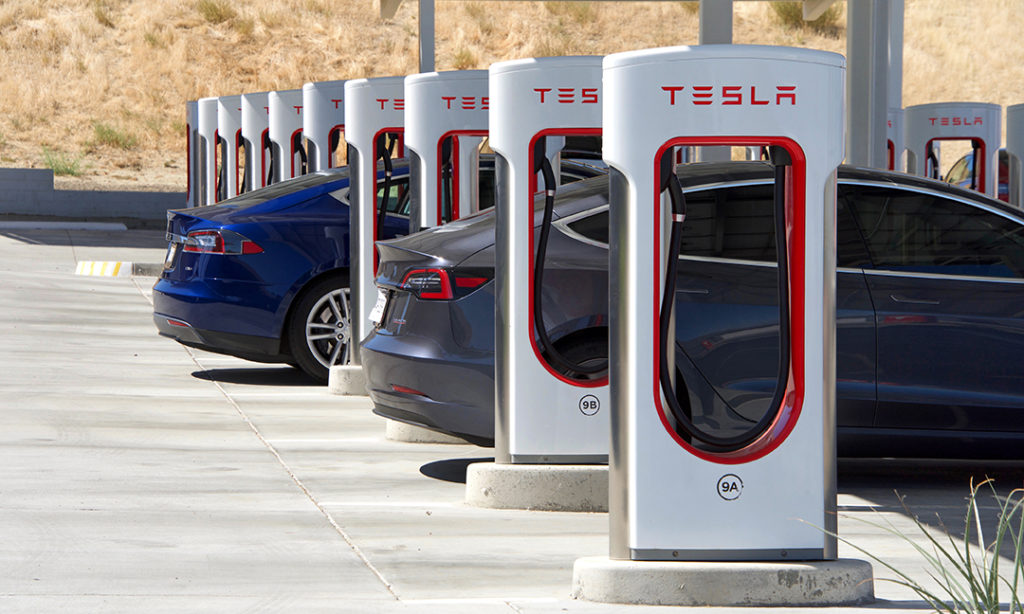In the UK, new electric vehicles are eligible for the plug-in car grant. The scheme was created to encourage people to purchase electric cars and vans instead of traditional petrol and diesel ones. Recently, it was announced that the grant amount will be reduced from £3,000 to £2,500.
As covered previously, there has been a recent surge in demand for electric cars. This has prompted the scheme to reduce its financial incentive. The upper limit for the scheme has also been reduced from 50,000 to 35,000.
The End Of The ‘Tesla Subsidy’
Tesla’s Model 3, the UK’s most popular electric car, retails for around £40k, making it now out of range for the grant. Due to the dominance of Tesla in the EV market many referred to this grant a ‘tesla subsidy’, giving the firm’s buyers a £3k discount.
The government, however, has reassured those in the car industry that the same amount of money (£403 million) will be available for the plug-in car grant up until April 2023.
To an extent, we agree that with the government’s opinion that the assistance shouldn’t focus on purchasers of high-end cars. The purpose of entitlements like the plug-in car grant should be to make EVs more affordable for everyone and encourage choices that reduce their carbon footprint. Decreasing motorists’ carbon footprint is achieved by moving as many people as possible to make the switch from diesel to electric.
However, incentivising buyers of both affordable and high-end cars to make the switch by making the grant universally attractive to buyers at all levels is the way to do that.
Increasing the price of vehicles previously covered under the scheme effectively discourages high-end electric vehicle purchases and runs contrary to the government’s stated green aspirations.
Both Buyers and Sellers Could Have An Overnight Nightmare
Edmund King, president of the AA, made a good point: “Those waiting for delivery of the stylish entry-level Ford Mustang Mach-E will suddenly find that the price has gone up by £3,000.” For people factoring in the subsidy into their new card budget, this may have a worse effect than the grant not existing at all.
To counter this, car firm Citroen has cut the cost of their electric models following the changes to the maximum car prices of the plug-in grant. Other car companies will likely follow suit to attract buyers looking to take advantage of the grant. British company MG has said that they will continue to offer buyers of electric vehicles a £3000 discount, in a bid to stay competitive.
Is Enough Being Done To Plan For The Future?
Some believe that not enough has been done to make electric vehicles affordable, with calls to eliminate VAT on electric cars for those from lower-earning households. Even with grants and lower charging fees, the upfront cost of electric cars is still much higher than traditional petrol and diesel. Many expect that prices won’t be comparable well into the 2020s.
Many in the motor sector are worried about the effects this change will have on their industry, which is already struggling because of the pandemic. Purchases of new cars are at an all-time low. Some car firms could suddenly find their electric vehicles far less unattractive to buyers by virtue of being above the grant’s new threshold.
The Wrong Move At The Wrong Time
The motor trade has been tasked with facilitating the government’s deadline for banning sales of new internal combustion engine (ICE) cars and even most hybrids by 2030 by producing suitably attractive alternatively fuelled models.
Mike Hawes of the SMMT says the change to the grant could not have come at a more disastrous time for the motor industry, he called it ‘the wrong move at the wrong time’. Hawes believes it sends confusing messages to consumers and puts further strain on the sector.
Juggling the worst sales figures in decades whilst heading towards the biggest change in motor trade history is an considerable challenge. The motor trade needs all the support it can get.


